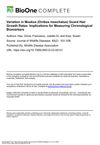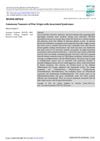 1 citations,
January 2017 in “Journal of Community & Public Health Nursing”
1 citations,
January 2017 in “Journal of Community & Public Health Nursing” Wearing a cap doesn't affect quality of life for Indian men with hair loss, but severe hair loss does lower it. Older men have more severe hair loss, and those who wear caps more often want less treatment.
 1 citations,
May 2016 in “Current Opinion in Pediatrics”
1 citations,
May 2016 in “Current Opinion in Pediatrics” Children's hair loss can be caused by various factors and should be treated with appropriate, age-specific methods and psychological support.
 1 citations,
March 2014 in “Senses and Sciences”
1 citations,
March 2014 in “Senses and Sciences” A supplement with Serenoa repens improved hair loss in a patient.
 1 citations,
September 2013 in “Mayo Clinic Proceedings”
1 citations,
September 2013 in “Mayo Clinic Proceedings” A woman's hair loss was treated successfully with iron supplements for her iron deficiency.
 1 citations,
May 2013 in “Journal of the Egyptian Women's Dermatologic Society (Print)”
1 citations,
May 2013 in “Journal of the Egyptian Women's Dermatologic Society (Print)” Women with hair loss have higher heart disease risk and unhealthy cholesterol levels.
 1 citations,
November 2011 in “Dermatologica Sinica”
1 citations,
November 2011 in “Dermatologica Sinica” Women using hair relaxers with alopecia had lower zinc levels, suggesting zinc deficiency might contribute to hair loss.
 1 citations,
November 2001 in “Acc Current Journal Review”
1 citations,
November 2001 in “Acc Current Journal Review” Electron Beam Tomography (EBT) is a useful additional test to stress testing for detecting heart disease.
 1 citations,
January 2001 in “Dermatologic Surgery”
1 citations,
January 2001 in “Dermatologic Surgery” Pulsed dye laser and hydrogel dressings effectively treat hypertrophic scars.
 1 citations,
January 1996 in “Gynecological endocrinology”
1 citations,
January 1996 in “Gynecological endocrinology” Non-invasive imaging helped diagnose a woman's severe hormone imbalance and diabetes, and medication successfully treated her condition.
 September 2024 in “International Journal of Research and Review”
September 2024 in “International Journal of Research and Review” Wiesbaden 30C effectively reduces hair fall and improves hair growth in young adults with Telogen Effluvium.
 July 2024 in “International Journal of Medical Arts”
July 2024 in “International Journal of Medical Arts” Latanoprost is more effective than minoxidil for treating alopecia areata.
 June 2024 in “Archives of dermatological research”
June 2024 in “Archives of dermatological research” Dietary supplements might help prevent post-COVID hair loss, but serum ferritin is not a reliable indicator.
 May 2024 in “International journal of nanomedicine”
May 2024 in “International journal of nanomedicine” Plant-derived extracellular vesicles show promise for treating diseases like cancer and inflammation.
 April 2024 in “Proceedings”
April 2024 in “Proceedings” People with alopecia areata often have lower iron levels than healthy people.
 April 2024 in “Journal of wildlife diseases”
April 2024 in “Journal of wildlife diseases” Muskox hair growth rates vary widely, so a single growth rate can't be used for all populations.
 January 2024 in “Clinical, cosmetic and investigational dermatology”
January 2024 in “Clinical, cosmetic and investigational dermatology” Dermatologists should customize cosmetic treatments for dark-skinned patients to minimize risks and complications.
 December 2023 in “Intisari Sains Medis”
December 2023 in “Intisari Sains Medis” SLE and DM can coexist but are rare and need careful evaluation.

Stress significantly contributes to hair loss, especially in women and those aged 31-40.
 October 2023 in “Research Review”
October 2023 in “Research Review” Some skin tumors from hair follicles and glands can be linked to genetic syndromes and may be benign or malignant.
 September 2023 in “Mağallaẗ baġdād li-l-ʿulūm”
September 2023 in “Mağallaẗ baġdād li-l-ʿulūm” Microbial communities in Duku plant roots vary between wet and dry habitats, affecting plant health.
 September 2023 in “Dermatology and therapy”
September 2023 in “Dermatology and therapy” Ritlecitinib effectively improves hair growth in alopecia areata patients, regardless of hair loss pattern.

Inhibiting AP-1 changes skin tumor types and affects tumor cell identity.

Inhibiting AP-1 changes skin tumor types and affects tumor cell identity.
 November 2022 in “Research Square (Research Square)”
November 2022 in “Research Square (Research Square)” Seasonal changes affect hair growth genes in Angora goats, possibly influencing mohair quality.
 October 2022 in “Gadua Journal of Pure and Allied Science”
October 2022 in “Gadua Journal of Pure and Allied Science” Terbinafine is the most effective treatment for tinea capitis, a scalp infection often confused with other conditions.
 April 2021 in “Sohag Medical Journal”
April 2021 in “Sohag Medical Journal” Alopecia areata is an autoimmune condition causing hair loss, linked to genetic factors and immune system issues, with no cure yet.
 March 2021 in “Research Square (Research Square)”
March 2021 in “Research Square (Research Square)” Patients with RASopathies have a higher risk of autoimmune disorders and should be routinely screened.
 February 2020 in “Scholars international journal of traditional and complementary medicine”
February 2020 in “Scholars international journal of traditional and complementary medicine” Ayurveda treats hair problems like hair loss and dandruff by balancing body elements and using natural remedies like Indian Gooseberry and false Daisy.
 January 2020 in “Elsevier eBooks”
January 2020 in “Elsevier eBooks” Plant-based chemicals may help hair growth and prevent hair loss but need more research to compete with current treatments.
 December 2019 in “bioRxiv (Cold Spring Harbor Laboratory)”
December 2019 in “bioRxiv (Cold Spring Harbor Laboratory)” Redheaded people have higher levels of a vitamin D precursor, suggesting red hair may be an adaptation for better vitamin D synthesis in areas with less sunlight.





























